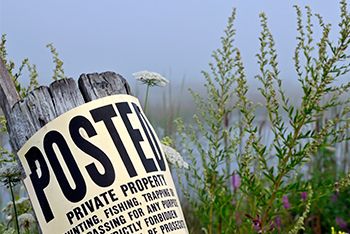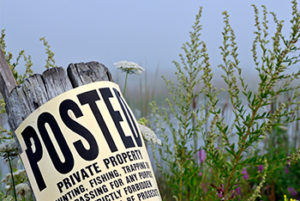
Quiz: When Can Someone Claim Your Property? Adverse Possession Defined
 Everyone probably has a book on their shelf that is not actually theirs. Picked-up along the way and the rightful owner long forgotten. It’s now possessed by you – it wasn’t intentional or malicious, it just is.
Everyone probably has a book on their shelf that is not actually theirs. Picked-up along the way and the rightful owner long forgotten. It’s now possessed by you – it wasn’t intentional or malicious, it just is.
Wisconsin law permits the same with land – it is called adverse possession. Provided certain criteria are met, possession of property can determine ownership, despite record title. Consider an established fence line dividing two properties that after some period of time is determined to be placed incorrectly. After the discovery, the record owner probably feels entitled to what is theirs, however, in the mind of the possessor the land has been theirs.
“There’s a good reason why adverse-possession disputes are so pervasive. Both the true owner and the adverse possessor feel entitled and emotionally attached to the disputed land. This emotional attachment can make negotiation and settlement very difficult and can quickly escalate toward litigation,” states Jessica Shrestha, an attorney with Wheeler, Van Sickle, and Anderson.
What are the criteria that establish adverse possession? According to Wisconsin common law, an adverse possession claim needs to have occupancy that is exclusive, uninterrupted, continuous, hostile, and open and notorious for the statutorily required length of time. These criteria often overlap, but let’s break them down.
Occupancy – the land is used to which it is capable and as an owner would make of it.
Exclusive – the possessor needs to demonstrate that their possession was to the exclusion of the true owner. If both landowners used the disputed land, the adverse possessor cannot establish exclusivity and the claim would fail.
Uninterrupted – where adverse possession is interrupted, by repossession by the record owner or otherwise, the clock stops and can prevent title to accrue by adverse possession.
Continuous – The possessor needs to demonstrate that their activities were continuous for the entire statutorily required length of time. For example, a few timber harvests over decades has failed to establish continuous use.
Hostile – Use of the land that is inconsistent with the rights of the legal owner and not subordinate to those rights. To be clear, this is not a requirement for hostile behavior between possessor and legal owner.
Open and notorious – Obvious use of the property by the possessor as to provide notice that the land is adversely possessed by another. For example, seasonal hunting, timber harvests, and temporarily posting no trespassing have failed to establish open and notorious possession in specific situations.
Statutorily required length of time – That is our quiz question!
What is the statutorily required length of time in years to establish adverse possession?
A. 5 years
B. 10 years
C. 15 years
D. 20 years
The answer is D! Twenty years is the typical time period, but it is important to remember that adverse possession can actually occur in Wisconsin after 7 to 10 years depending on specific facts. For example, the period may be shorter under specific Wisconsin statutes when possession or use includes a deed describing the land, when the possessor pays property taxes in addition to having a deed, or when a utility is involved.
